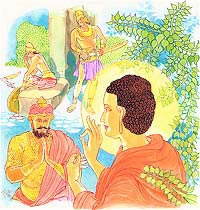13 06 2012 WEDNESDAYLESSON 635 FREE ONLINE eNālāndā Research And Practice UNIVERSITY And THE BUDDHISTONLINE GOOD NEWS LETTER by ABHIDHAMMA RAKKHITA through http://sarvajan.ambedkar.org
Dhammapada: Verses and Stories Dhammapada-
Verse 201. Kosalaranno Parajaya Vatthu
Happy About Both Victory And Defeat

Verse 201. Happy About Both Victory And Defeat
Victory gives rise to hate,
those defeated lie in pain,
happily rest the Peaceful
surrendering victory-defeat.
Explanation: Victory brings hatred into being. The defeated
person lives in misery. But the person, whose mind is calm and tranquil,
lives happily as he has risen above both victory and defeat.
Dhammapada Verse 201
Kosalaranno Parajaya Vatthu
Jayam veram pasavati
dukkham seti parajito
upasanto1 sukham seti
hitva jayaparajayam.
Verse 201: Conquest begets enmity; the conquered live in misery; the peaceful
live happily having renounced conquest and defeat.
The Story of the Defeat of the King of Kosala
While residing at the Jetavana monastery, the Buddha uttered Verse (201) of
this book, with reference to the King of Kosala who was defeated in battle by
Ajatasattu, his own nephew.
In fighting against Ajatasattu, the King of Kosala was defeated three times.
Ajatasattu was the son of King Bimbisara and Queen Vedehi, the sister of the
King of Kosala. The King of Kosala was ashamed and very much depressed over his
defeat. Thus his lamentation: “What a disgrace! I cannot even conquer this
boy who still smells of mother’s milk. It is better that I should die.”
Feeling depressed and very much ashamed, the king refused to take food, and kept
to his bed. The news about the king’s distress spread like wild fire and when
the Buddha came to learn about it, he said, “Bhikkhus! In one who
conquers, enmity and hatred increase; one who is defeated suffers pain and
distress.”
Then the Buddha spoke in verse as follows:
| Verse 201: Conquest begets enmity; the conquered live in misery; the peaceful live happily having renounced conquest
Arunachal Pradesh Gets Country’s Fourth Buddhist Centre
Himalayan state Arunachal Pradesh, where around 13 per The Central Institute of Himalayan Culture Studies at Dahung in West Kameng district, where a majority of the people follow Tibetan Buddhism, is now a full-fledged central institute, according to its founder Tsona Gontse Rinpoche. The institute, conceived by Rinpoche in 2000, had received the nod of the Union Cabinet on May 26, 2010 with a project cost estimated at Rs 9 crore and recurring annual cost of Rs 124.86 lakh. “It began with a central government grant of just Rs 97 lakh and has since grown into a good institute to fill the vacuum in imparting education on Buddhism,” Rinpoche said. “I had pursued the Centre to establish such an institute considering the large number of Buddhist population residing in the Northeast,” he said. He pointed out that with only 25 faculty members and limited infrastructures, the institute has so far produced two batches (18 each) of Shastri (equivalent to BA in Buddhist Philosophy) degree holders. Besides teaching arts and crafts for self-sufficiency and sustainable development and preservation of ethnic identity to foster national integrity, the institute has been inculcating an awareness on the ecological balance and preservation of natural resources, he said. He said the other three institutes are: Nava Nalanda Mahavihara, a deemed university, Central University for Tibetan Studies, Sarnath, Varanasi, and Central Institute for Higher Buddhist Studies, Leh. Rinpoche, recognized as the 13th reincarnation of Buddhist eminent spiritual guru in 1971 by the 14th Dalai Lama, is a monk-turned-politician and social worker. He disclosed that 30 acres of land was provided by the Bugun community free of cost for the institute which has been running on an ad-hoc basis for over a decade and henceforth would be completely funded by the MoC. The Buddhist population of the state resides in the region’s Tawang, West Kameng, remote regions which are close to Tibet and near the Myanmar border. Tibetan Buddhism is practised in the first three regions while Therevada Buddhism reigns supreme in the lives of people living near the Myanmarese border. Rimpoche earnestly believes that the institute will soon turn into a deemed university. VOICE OF SARVAJAN Uttar Pradesh crime stats: 699 murders in 45 days of Akhilesh Yadav’s ruleLUCKNOW: On the backfoot over deterioration of law and order in the Uttar Pradesh (UP) after it came to power in March earlier this year, the Samajwadi Party (SP) government released crime stats in the state assembly claiming that between March 1 to April 15, only 699 cases of murder, 263 rape cases and 249 incidents of loot have taken place in the state. |